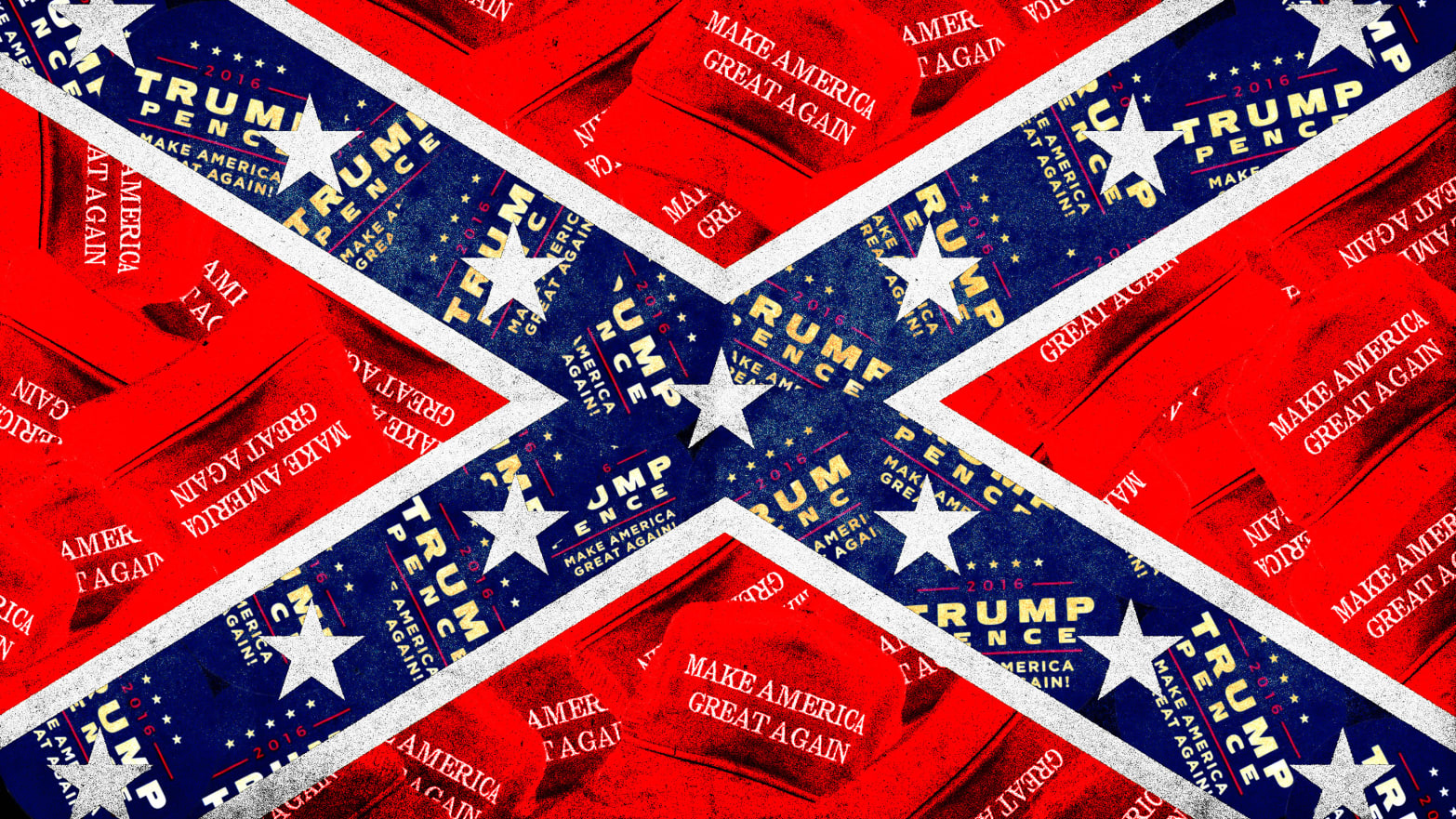The embers of the Civil War still glow, and the 45th president readily stokes them. As Donald Trump once again defended his “very fine people” and for good measure heaped hosannas upon Confederate general Robert E. Lee, Republican pushback amounted to beating up on Rep. Ilhan Omar (D-MN).
Under our eyes, the Republican Party is being recast in the images of Trump and the Old Confederacy. If Sen. Lindsey Graham (R-SC) could ditch his amigo John McCain after a few months in the grave, walking away from the legacy of long-dead Abraham Lincoln is even easier. If you have any doubt, just look at the 2018 midterm elections and the president’s nominees to the federal judiciary.
ADVERTISEMENT
Trump’s picks for the bench are declining to say whether Brown v. Board of Education—the Supreme Court’s landmark 1954 decision that struck down government-sanctioned racial segregation as unconstitutional—is binding precedent and properly decided.
Wendy Vitter, one of Trump’s judicial nominees, framed her view of Brown this way: “I think I get into a difficult area when I start commenting on Supreme Court decisions, which are correctly decided and which I may disagree with.” Vitter did not indicate which part of the famed desegregation case she had a problem with, and remains unconfirmed by the Senate. David Vitter, her husband, is a former senator whose name surfaced in a prostitution scandal.
Andrew Oldham, now a judge on the Court of Appeals, an intermediate appellate court, took a similar approach. Oldham decried the doctrine of separate but equal at his confirmation hearing but refused to vouch for the validity of Brown. As he put it, Brown merely “corrected an egregious legal error.”
Neomi Rao, who replaced Brett Kavanaugh on the D.C. Circuit, likewise engaged in a legal minuet. Rao told the Senate Judiciary Committee that “Brown is a really important precedent” and that Plessy v. Ferguson was a “real black mark on our history.” Still, she refused to affirm Brown’s validity.
Since the Civil War there has always been a Southern Party, and that party frequently echoes strains of the Old South. Think hostility toward civil rights coupled with a wariness toward modernity.
Although Southern did not automatically equal neo-Confederate, at times the distinction gets lost. And to be sure, the Republican Party wasn’t always the Southern Party. Instead, it was the Democrats who were the first Party of the South.
ADVERTISING
During the debate over the 1964 Civil Rights Act, it was the congressional GOP that gave President Johnson the votes he needed to overcome Dixiecrat opposition. But passage of the Civil Rights Act marked a turning point.
In the aftermath of Johnson signing the bill into law, the Republicans nominated Sen. Barry Goldwater as their presidential nominee, although Goldwater had opposed the law’s passage. In the end, Goldwater was shellacked in a landslide, and won only his home state of Arizona and five states in the Deep South. Looking back, Goldwater’s defeat became a harbinger of Swexodus, the migration of Southern whites to the Republican Party.
Four years later, in 1968, Richard Nixon bested Democrat Hubert Humphrey as a result of the Vietnam War, disgust with the urban unrest that followed the Civil Rights Act and LBJ’s Great Society, and Nixon’s own embrace of the Southern Strategy. As president, Nixon kept his bargain with segregationist Sen. Strom Thurmond and nominated Clement Haynsworth and Harold Carswell to the Supreme Court. Nixon then watched those nominations go down in flames over civil rights and segregation.
But Nixon also advocated racial set-asides on government contracts and expanded the litigation authority of the Equal Employment Opportunity Commission. In the end, Nixon sought to straddle the line, and was rewarded with 18 percent of the black vote in his 1972 reelection bid, a number that has not since been duplicated.
RELATED IN POLITICS
Those days are gone and the world knows it. During the 2016 election cycle, the Internet Research Agency (IRA), a Russian troll factory, organized pro-confederate flag rallies. For good measure, as detailed by Special Counsel Robert Mueller, the IRA also claimed that the Civil War was not “about slavery” and instead was “all about money.”
Trump’s jock-sniffing of Lee is no surprise. According to a post-Charlottesville poll, almost one in 10 Americans are OK with white supremacy as an ideology, and another tenth are fine with the alt-right. Said differently, there is a constituency for Trump’s brand of racially tinged red meat, and the president wants its votes. Pepe was prelude. When Trump gives a shout-out to a white No. 2 NFL draft pick, Nick Bosa, and ignores No. 1 Kyler Murray, an African-American, there is little room for nuance.
It’s not just millennials and minorities who had their fill with the GOP but suburban mothers too. The moms of Southern Methodist University (think Laura Bush) and Rye, New York (think Barbara Bush), helped put the speaker’s gavel into Nancy Pelosi’s hands. The Junior League is in revolt, and that’s a problem for the president and his party.
“Heritage not Hate” read the sign right beneath a Confederate flag in the run-up to the 2018 midterms. But the venue was not the Deep South. Rather, it was a pickup truck parked in a driveway on an early autumn day in New York’s Hyde Park, a village 75 miles north of Manhattan. Like Scarlett O’Hara with Tara in Gone With the Wind, Trump is aiming to restore the grandeur of bygone days. As always, the past is never past.






No comments:
Post a Comment